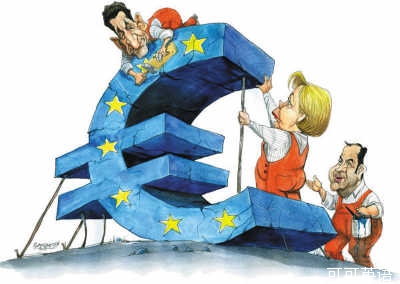(单词翻译:单击)

In the past eight months before Cyprus erupted people have frequently reminded me, often with a smirk, of a forecast I made in late November 2011. On these pages, I declared that eurozone leaders had 10 days to save the euro. I made an ultimately similar, though less dramatic, prediction in 2006 when I wrote that Romano Prodi’s administration offered Italy’s last chance to achieve a sustainable position in the eurozone.
塞浦路斯危机爆发之前的8个月里,人们经常面带得意的笑容提起我在2011年11月末曾做的预测。在那篇文章中,我断言欧元区领导人只有10天的时间来拯救欧元。2006年的时候,我也做过类似但却没有这么极端的预测,当时我写道,罗马诺??普罗迪(Romano Prodi)政府为意大利提供了在欧元区获得持久地位的最后机会。
Mr Prodi’s administration did not deliver. The 10 days in 2011 passed without action. It is 2013, the euro is still there, Italy is still in it – and I am still making forecasts. Undeterred, I will double down today. A eurozone that compromises countries as diverse as Germany and Cyprus is not sustainable, even if the EU and Cyprus manage to find a last-minute compromise. An operational banking union that comprises supervision, resolution and deposit insurance would have been a minimally sufficient condition to make a divergent monetary work against the odds. It would have solved the problems of the Cypriot banks for sure. But the eurozone does not have such a banking union. It will not have such a banking union in five years. Germany rejects it flat out on the grounds that it is too expensive for the German taxpayer. Ironically, Cyprus would also reject it as it would kill the country’s business model as an offshore centre for foreign deposits. Whatever banking union will ultimately emerge in thelong run will be irrelevant to this crisis.
但普罗迪政府却并没有交出满意答卷。2011年的那10天欧元区也没有任何行动。到了2013年,欧元依然存在,意大利也依然留在欧元区。而我,也依然在预测。现在我毫不畏惧,并且会翻倍下注。一个包括德国和塞浦路斯这样差异明显的国家的欧元区是不可持续的,即使欧盟(EU)和塞浦路斯能够达成最后一刻的妥协。一个包括监督、清盘机制和存款保险的银行业联盟,是确保存在分歧的货币体系克服各种艰难险阻的最低条件。它肯定能够解决塞浦路斯银行的问题。但欧元区却没有这样的银行业联盟,五年内也不会有。德国断然拒绝,原因是对于德国纳税人来说代价太高。颇有讽刺意味的是,塞浦路斯也会拒绝这一联盟,因为它会破坏该国作为外国储蓄离岸中心的商业模式。长期来看,不管最终会出现什么样的银行业联盟,都与这场危机无关。
What happened in Cyprus last week is not a deep cause of anything. But it is a perfect illustration of the eurozone’s collective action problem. This latest escalation began with the dangerous agreement to bail-in insured depositors. Eurozone officials are as legally literate as they are economically illiterate. Their ever so brilliant idea was not to haircut insured deposits of under 100,000, but simply to tax them. They did not realise that if they take away the promise inherent in deposit insurance, they are in default, and in danger of starting a bank run.
上周塞浦路斯发生的情况并不会是任何危机的根本导火索,但却非常清晰地暴露了欧元区集体行动存在的问题。事态的最新升级始于一项危险的协议,即让受保险保护的储蓄者提供内部纾困。欧元区官员们有多精通法律,在经济上就有多无知。他们“聪明透顶”的想法不是减记10万欧元以下受保险保护的存款,而是对它们征税。他们没有意识到,如果他们拿走存款保险中固有的承诺,他们就是在违约,可能引发银行挤兑的风险。
The Cypriot parliament was right to reject this mad deal. But the Cypriot government then committed three subsequent blunders. The first was the decision by President Nicos Anastasiades to seek help from Russia. Instead of working with the eurozone, he worked against it. The Germans, in particular, saw this as an openly hostile move. It was also ill-judged because the Russians rejected the offer. The second was the decision not to communicate with the European finance ministers and the euro working group for three critical days last week. The third was the Cypriot government’s proposal on Thursday to create a sovereign wealth fund backed by a raid on the pension fund and other state assets. On Friday Angela Merkel swiftly dismissed it.
塞浦路斯议会拒绝这份疯狂的协议是正确的(编者注:欧盟与塞浦路斯于本周一达成救助协议)。但塞浦路斯政府接着却犯了三个大错。第一就是总统尼科斯??阿纳斯塔夏季斯(Nicos Anastasiades)决定寻求俄罗斯的帮助。他并没有与欧元区合作,而是对着来。德国尤其将此看作一个公开的敌对之举。同时这也是欠思考的,因为俄罗斯拒绝提供帮助。第二,在上周关键的三天内,塞浦路斯政府决定不与欧洲各国财长以及欧元工作组对话。第三,塞浦路斯政府上周四决定从养老基金和其他国家资产中紧急抽取资金创建一个主权财富基金。第二天安格拉??默克尔(Angela Merkel)就立即否定了它。
What happened last week is a fitting example of European political leaders, in a most unprofessional pursuit of narrow national interests, failing to defend the common good.
上周发生的情况突显了欧洲政治领导人物的典型特征,他们以一种非常不专业的方式追求狭隘的国家利益,却损害了共同利益。
The main risk I want to emphasise is, however, not a big accident. It might happen, of course. But I suspect the single biggest risk ultimately stems from the eurozone’s repeated policy errors. Their effect is slow but cumulative.
然而,我想强调的主要风险并不是发生一次严重事件的风险。当然这是可能发生的,但我认为最大的风险最终来自欧元区不断重复的政治错误。它们的影响比较缓慢,却是累积性的。
Of those, the most damaging has been the policy of asymmetric adjustment through austerity. Banks in Cyprus are falling now because the Greek state and Greek banks fell earlier, and because the eurozone forced a private-sector involvement. In Italy, it was also austerity that turned a recession into a depression. That, in turn, transformed an anti-euro, anti-establishment protest movement into the single largest political party in the Italian parliament at the last elections. There is a good chance that its leader, Beppe Grillo, could end up with an absolute majority if Italy were to hold another round of elections later this year.
毫无疑问,最具破坏性的是通过紧缩来进行非对称调整的政策。当前塞浦路斯银行纷纷陷入困境,是因为希腊政府和希腊银行之前陷入困境,也因为欧元区强行把私营领域牵涉进来。意大利也是由于紧缩而从衰退步入萧条。正是因为这个原因,在最近的选举中,一个反对欧元、反对传统政党的抗议运动成为意大利议会中最大的单一政党。如果今年晚些时候意大利举行另一轮选举,该政党领导人贝佩??格里洛(Beppe Grillo)很可能会赢得绝对多数选票。
If austerity in the south had at least been compensated by fiscal expansion in the north, the overall fiscal stance of the eurozone would have been macroeconomically neutral. But since the north joined the austerity, the eurozone ended up with a primary fiscal surplus in a recession. In such an environment, economic adjustment simply does not take place. Without that, there can be no solution to the crisis.
如果欧洲南部的紧缩至少能够得到北部财政扩张的弥补,那么欧元区的整体财政立场在宏观经济层面上就会趋向中立。但由于北部也加入了紧缩,结果欧元区在衰退中反而实现了基础财政盈余。在这种环境下,一般不会发生经济调整。而如果没有调整的话,危机就没有解决方案。
I have believed for some time that it is impossible for Germany, Finland and the Netherlands to be in a monetary union with Cyprus, Greece and Portugal. Either the two sides agree to adjust more symmetrically, politically and economically, or this experiment should end.
一段时间以来我一直认为,德国、芬兰、荷兰不可能与塞浦路斯、希腊、葡萄牙在同一个货币联盟中。如果双方不能够更加平衡地在政治和经济上做出调整,这一尝试就只能结束。
The prediction I made in November 2011, and which I am repeating today, is that it will probably end one day, though that day may still be a long way off. I cannot exclude the possibility that the various governments will do the right thing, but three years of crisis management suggest otherwise.
2011年11月我所做出的预测就是,有一天欧元区很可能会终结,尽管这一天或许依然很遥远——今天我还要重复这样的预测。不能排除各国政府会采取正确行动的可能性,但三年以来的危机管理显示的正相反。
With the current policy, they will need force to keep it going against the interests of the people. You do not need to be a eurosceptic to conclude that such a monetary union is also deeply immoral.
在当前政策下,要让欧元区违背人民的利益存在下去,他们得使用强制力。就算你不是欧元怀疑论者,也会给这样一个货币联盟贴上“极不道德”的标签。


